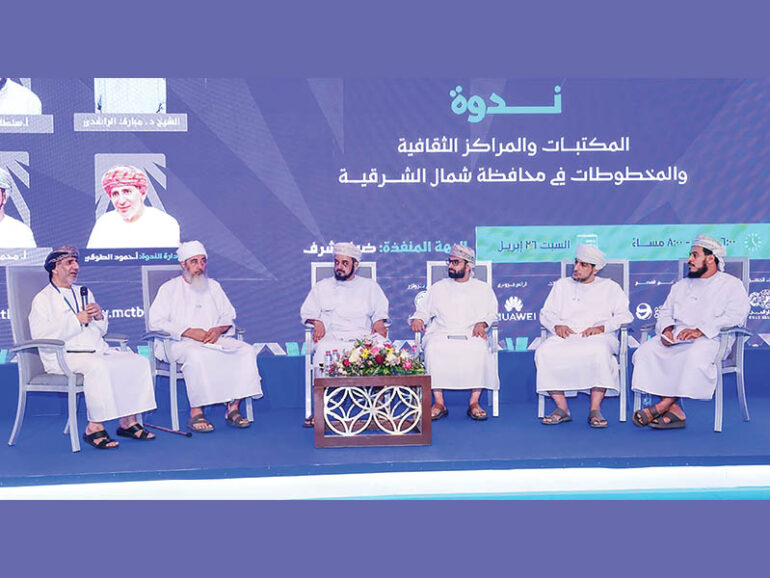National libraries are essential to Oman’s cultural legacy, playing a key role in preserving the nation’s history and supporting its literary movement. A recent seminar held at the 29th Muscat International Book Fair highlighted the importance of libraries in Oman’s cultural development. Titled “Libraries, Cultural Centers, and Manuscripts in North Sharqiyah Governorate,” the seminar was hosted by North Sharqiyah, this year’s guest of honor at the event. Experts discussed how libraries contribute to Oman’s heritage and their role in the digital age.
Libraries as Pillars of Oman’s Cultural Movement
The seminar underscored the critical role libraries play in advancing Oman’s cultural and literary landscape. Dr. Saeed bin Saif al Maskari, the editor of Al Falaq magazine, spoke about how libraries are vital to preserving Oman’s rich history. Through their collections of documents, manuscripts, and other resources, libraries provide access to valuable cultural knowledge. Libraries are essential resources for researchers, students, and the public, supporting both academic and cultural endeavours.
Challenges of Preserving Omani Heritage
However, Maskari also pointed out several challenges libraries face. One of the most pressing issues is the preservation of fragile manuscripts, particularly in Oman’s humid climate. Many of these valuable collections, often stored in rural areas, are at risk of damage. Additionally, urban migration and the rise of digital media have made these collections less accessible. There is a need for better methods to protect and preserve these historical documents for future generations.
Libraries’ Impact on Society and Youth Development
Dr. Mubarak bin Abdullah al Rashidi, head of the Sinaw Culture Centre, spoke about the broader role libraries play in society. He highlighted that libraries are more than just places for books—they are centers for community development. Libraries help guide youth, nurture moral values, and promote a lifelong love of reading. Through diverse educational programs, libraries encourage skill-building and knowledge-sharing, helping to shape the next generation of Omani citizens.
Libraries as Cultural and Intellectual Hubs
Researcher Khalid bin Saeed al Rashidi expanded on the multifaceted roles of libraries. While libraries are traditionally seen as educational institutions, they also serve as cultural, intellectual, and historical hubs. Al Rashidi emphasized the importance of libraries in providing access to rare books, manuscripts, and documents. These resources are invaluable for anyone seeking to understand Oman’s cultural and intellectual heritage.
Oman’s Manuscript Collections: A Rich History
Mohammed al Aysari, another researcher, revealed that North Sharqiyah is home to a significant number of manuscripts, second only to Muscat governorate. He identified two major repositories of Omani manuscripts: the Omani Manuscript House at the Ministry of Culture, Sports and Youth, and the Sayyid Mohammed bin Ahmed al Busaidi Library. These libraries are key to preserving the nation’s historical documents.
Aysari also noted that the Noor al Din al Salmi Library and Sheikh Salem bin Hamad al Harthy Library are important manuscript repositories, ranking third and fourth in North Sharqiyah.
Manuscript Distribution Across North Sharqiyah
Aysari provided an interesting breakdown of manuscript holdings in the region. The wilayat (province) of Al Qabil leads North Sharqiyah with 749 manuscripts. Other areas, including Bidiyah (685), Ibra (241), Mudhaibi (195), Sinaw (119), and Dima Wa Al Taien (91), also house significant collections. These figures illustrate the wide distribution of manuscripts across North Sharqiyah, reflecting the region’s rich cultural heritage.
Preserving Oman’s Heritage for Future Generations
As Oman continues to embrace modernization, the role of libraries in preserving the country’s cultural legacy has never been more critical. Libraries are not only places of learning, but they also serve as guardians of history, culture, and intellectual development. Ensuring the preservation of Oman’s manuscripts and documents is essential for future generations to better understand and appreciate their rich heritage. It is clear that libraries will continue to play a central role in Oman’s cultural movement, bridging the past and the future.


